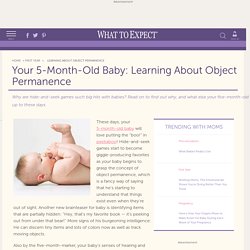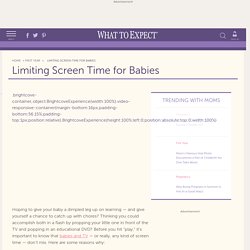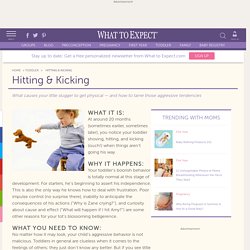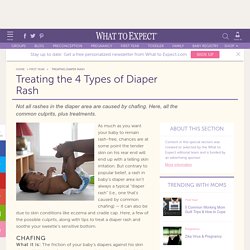

Sitting Up. After months of reclining and tummy time, your baby might be ready for a change of scenery.

Starting in month 3 or 4 (or whenever he holds his head up well and seems interested and ready), propping your baby up to sit with support will give him an amazing new vantage point on the world around him. The more practice your little one gets holding himself upright with support in an assisted seated position, the sooner he'll discover the pleasures of independent sitting — including a better vantage point on all his favorite toys (and his favorite people). Looking for more fun firsts? Visit our Milestones Center! 5 Month Old Baby: Learning About Object Permanence. These days, your 5-month-old baby will love putting the "boo!

" in peekaboo! Hide-and-seek games start to become giggle-producing favorites as your baby begins to grasp the concept of object permanence, which is a fancy way of saying that he's starting to understand that things exist even when they're out of sight. Another new brainteaser for baby is identifying items that are partially hidden: "Hey, that's my favorite book — it's peeking out from under that bear! " More signs of his burgeoning intelligence: He can discern tiny items and lots of colors now as well as track moving objects.
Also by the five-month-marker, your baby's senses of hearing and vision are almost completely developed. Frustration With Finger Foods for Baby. Feeding the average nine-month-old can be a frustrating experience for parties on both sides of the high chair.

Frustrating for you because there's more squishing, squashing, and smashing of finger foods than eating; frustrating for your baby because you're pushing him to eat when all he really wants to do is squish, squash, and smash. Instead of hovering over the high chair, sit back and try to relax. At this age, mealtimes aren't only for nourishment; they're for exploring and discovering as well.
Just as he does in the bathtub and sandbox, during mealtime your baby is learning about cause and effect, textures, and temperature differences. Expect this mealtime mayhem (and your need for paper towels by the case) to continue over the next few months. Keep portions small. Η ανάπτυξη του παιδιού 2-3 ετών - Babyspace Greece. Τα χαρακτηριστικά αυτής της περιόδου είναι η αυτονομία και η αυτάρκεια, αρετές που το παιδί κατακτά με εντυπωσιακά γρήγορους ρυθμούς.

Ουσιαστικά, πρόκειται για το στάδιο που το παιδί αφήνει πίσω του την ηλικία της εξάρτησης και οδεύει ολ... Σώμα Γενικά, η αύξηση των διαστάσεων του σώματος γίνεται με πιο αργούς ρυθμούς μόλις το παιδί συμπληρώνει το δεύτερο έτος της ζωής του. Το κάτω μέρος του σώματος επιμηκύνεται και η κοντοπόδαρη μικροσωμία της βρεφικής ηλικίας είναι πια παρελθόν. Από την κούνια στο μεγάλο κρεβάτι! - Babyspace Greece. Η μετάβαση από την κούνια στο μεγάλο κρεβάτι ή έστω η αφαίρεση του προστατευτικού κάγκελου της κούνιας είναι για το παιδί μια μεγάλη αλλαγή και ένα βήμα προς την ελευθερία.

Ποιά είναι η ενδεδειγμένη στιγμή για την αλλαγή αυτή και πώς θα ... Τηλεόραση: ναι, αλλά χωρίς υπερβολές - Babyspace Greece. Best Ways to Play. By far your little one’s favorite toy right now is you!

No bells or whistles, no flashy features, no gimmicks or gadgets necessary — just your voice, your face, your loving arms, and your tender touch. So playing with your baby is pretty simple at this age — in fact, you’re probably already doing a great job of it without even trying. Limiting Screen Time for Babies. Hoping to give your baby a dimpled leg up on learning — and give yourself a chance to catch up with chores?

Thinking you could accomplish both in a flash by propping your little one in front of the TV and popping in an educational DVD? Before you hit “play,” it’s important to know that babies and TV — or really, any kind of screen time — don’t mix. Here are some reasons why: Babies don’t learn from TV. Baby’s First Words. Your baby's first words are likely to happen after a few months of vocalizing and verbal experimentation, from coos to growls to sing-songy combinations of vowels and consonants.
But listen closely and one day you'll hear it: the first "real" word. By 8 months, your baby will probably start stringing together "ma-ma" and "da-da" sounds without necessarily knowing what they mean. But when those sounds start to transform into words with meaning, it's a developmental milestone that feels like magic. Looking for more fun firsts? Visit our Milestones Center! When Do Babies Start Talking? Toddler Hitting & Kicking.
What causes your little slugger to get physical — and how to tame those aggressive tendencies What it is: At around 20 months (sometimes earlier, sometimes later), you notice your toddler shoving, hitting, and kicking (ouch!)

When things aren't going his way. Why it happens: Your toddler's boorish behavior is totally normal at this stage of development. Treating Diaper Rash - Baby Diapering Essentials. As much as you want your baby to remain rash-free, chances are at some point the tender skin on his rear end will end up with a telling skin irritation.

But contrary to popular belief, a rash in baby’s diaper area isn’t always a typical “diaper rash” (i.e., one that’s caused by common chafing) — it can also be due to skin conditions like eczema and cradle cap. Here, a few of the possible culprits, along with tips to treat a diaper rash and soothe your sweetie’s sensitive bottom. Chafing. Toddler Development at 19-24 Months. Helping Your Toddler Adjust to a New Baby. Read This Next.

Facts About Sibling Relationships. Calling all moms of two or more — or simply those planning to have more than one: While it turns out the notion that birth order determines our personalities isn’t as scientifically sound as was once thought, there is lots of intriguing research about brothers and sisters you’ll probably find insightful or at least interesting. Here, a few top sib tidbits. Siblings spend more time with each other than with anyone else. According to one study, by the time kids with siblings are 11 years old, they’ve spent roughly 33 percent of their free time with them.
Even as they get older and have more outside interests and obligations, children still spend at least 10 hours a week with their brothers and sisters — in large families that number is more like 17 hours a week. Siblings have a huge influence on our outlook, personalities and behavior. Siblings tend to resemble each other in looks and intelligence but not personality. Older siblings might be smarter. How to Help Your Big Kid Adjust to a New Baby Sibling. Announce to your family and friends that you’re expecting again, and you’re bound to be greeted with enthusiastic rounds of congrats.
Tell your toddler the big news, and the reaction definitely won’t be such a sure thing. For starters, a young toddler likely won’t have the slightest clue what you’re talking about (“A baby in Mommy’s tummy...huh?”). Even if your little one grasps the basics, the announcement could leave a lot of mixed emotions in its wake: confusion (“What does being a big sister or brother mean?”) , excitement (“Cool — a new buddy!”) , anger (“I have to shareyou?!”) Coping With Night Terrors. It sounds like your son experienced a night terror — which can be truly terrifying for parents to watch!
The good news is that these eerie episodes are not dangerous nor are they uncommon (especially if your child is overtired) during toddlerhood. What makes a night terror different from a nightmare? Nightmares typically occur during the later, lighter dream (or REM) phases of sleep (which explains the 2 a.m. wake-up call you get with a nightmare). Your child will likely appear calm during a nightmare but may be frightened and upset afterward, when he wakes up and clings to you for comfort. He may remember the nightmare the next day.
Choosing a Babysitter: Six Steps to Babysitter Bliss. Buying a Toddler Bed - What to Look For. Protecting Kids From Extreme Cold. It’s some unearthly degree below freezing and the last place you want to be is anywhere but inside your cozy, warm home. But whether you have a baby who needs to be buckled in a car seat for a drive to the market, a toddler stationed at the window rearing for a romp in the snow, or a young child you need to bring with you when you pick up an older sibling at school, you need to go outdoors...and you’re not sure if it’s safe. You’ve got good reason: Little bodies have a harder time regulating temperature than big ones. In fact, according to the American Academy of Pediatrics (AAP), the younger the child, the smaller the ratio of her body mass to body surface — which means more heat escapes through her skin.
This freeze factor is especially problematic for newborns, who have less fat to insulate against the cold, can’t store enough energy to bump up their bodies' heat production, and can’t shiver (which is how the rest of us get our blood flowing as a temporary shield against the cold). How to Remove Splinters in Children. Given your child’s touchy-feely nature, it’s bound to happen: He gets hold of a rough-textured stick or encounters an unfinished 2 by 4 on your trip to the home improvement store and bingo!
A sliver of wood wriggles its way under his skin. That can hurt — and even cause an infection. Fortunately, removing splinters in children is almost always a quick and mostly painless process. Sleep Solutions for Babies. ΕΚΠΑΙΔΕΥΣΗ - manouleskaipaidakia. Παιδικός σταθμός: πότε και πού πρέπει να πάει το παιδί σας. Ο παιδικός σταθμός είναι μια πραγματικότητα στη ζωή του παιδιού και της οικογένειας και ένα πολύ σημαντικό βήμα στη ζωή και των δύο. Be Wise About Toddler Warnings. Toddler Food Throwing. What it is: Toddler Food Strikes. Toddler. Losing Your Cool With Your Toddler. Food for Toddlers: What to Serve. Feeding Schedule How-tos. Head Injuries in Children. How head injuries in children happen No matter how vigilant or conscientious you are, child injuries, like a knock on the noggin, happen somehow — and for kids under five, the majority of head injuries occur at home.
A wobbly toddler can tumble from the kitchen chair he insists on climbing. What To Expect. Toddler Swear Words & Bad Language. Why Push Toys Pay Off. Walking Safety. The early days of your child’s walking career may be exciting, but they’re often not pretty. Expect plenty of spills, crashes, and maybe even a cut lip or black-and-blue marks as your baby blazes her first trails. While you can’t keep her from falling — learning to get up is an important part of the process, after all — you can set the scene to cushion the blows, both to her noggin and her ego, with these walking safety tips. Routines for Children Rule. Baby-Led Weaning 101.
Παιχνίδια, Βρεφικός Εξοπλισμός, Οδηγός Συμβουλών & Online Παιχνίδια - Fisher Price. Reading to Babies Changes How Their Brains Work. Toddler Discipline: Limits for Your Child. How You Talk to Baby Impacts Social Skills Later On. Hotel-Safety Smarts for Families. Before You Go: What to Bring When Traveling With Kids. Picking the Right Family Vacation Resort Hotel.
Starting Childcare: How to Ease Into the Childcare Experience. 5 Tools for Raising Creative Children. Little Milestones for Toddlers. Baby Rash Cures. Foodchem11ljungmanganeseinformula.pdf. Foodchem11ljungmanganeseinformula.pdf. Keeping Your House Clean and Healthy. Interview Questions for Nannies. Treating Side Effects After Immunizations. Is Your Toddler Sleep Deprived? Baby Health and Safety. Toddler Fun With Photos. Breastfeeding Improves Baby's Dental Health Years Later. 6 Tips for Reading Aloud to Your Child. 11 Month Old Baby: Baby's Growing Independence. Διαταραχές Ύπνου. Παγιδευμένα Δάκτυλα. Flashlight Fun: Boosting Baby's Senses. Pour It On! Games for Hand-Eye Coordination. What To Expect. Feeding Baby When You're Away. Ready for the Playground: Outdoor Play Safety. Natural Eczema Treatments and Prevention Tactics. Πώς μεγαλώνει το παιδί τον 10ο μήνα.
Τι δεν πρέπει να τρώει το παιδί. Οδοντιατρικό πρόγραμμα πρόληψης. Breastfeeding While Pregnant. When to Visit the Dentist. Τα όνειρα των παιδιών. The Best Sippy Cups for Babies. Benefits of Infant Massage. The Nine-Month Checkup. 9 Month Old Baby: Early Communication Skills. The Five-Second Rule. The Role of DHA and ARA in Infant Nutrition and Neurodevelopmental Outcomes.